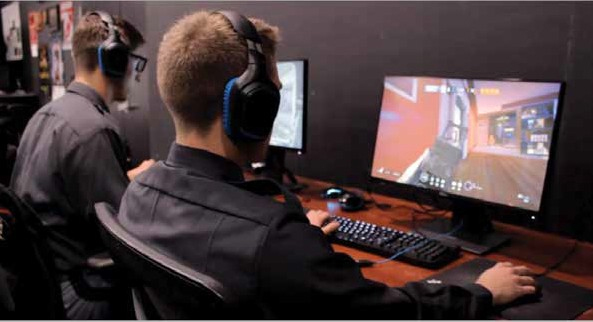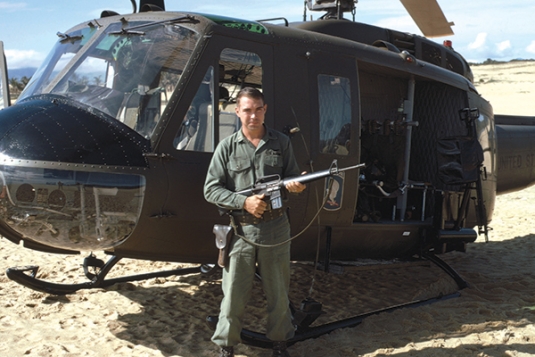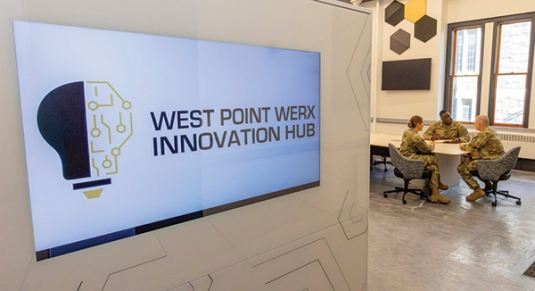Since its founding and as America’s first engineering school, West Point has been a pioneer in instructing military leaders to understand and employ technology in training and on the battlefield. Cutting-edge technology in the 1880s looked very different from the rapidly evolving and complex systems needed today to meet the changing needs of the Army’s multi-domain operational environments.
Technology—a catalyst of recent disruptive change in education, society, the economy, and the armed services—has driven significant change at the Academy. Today’s leaders are dealing with challenges we couldn’t have imagined 20 or 30 years ago.
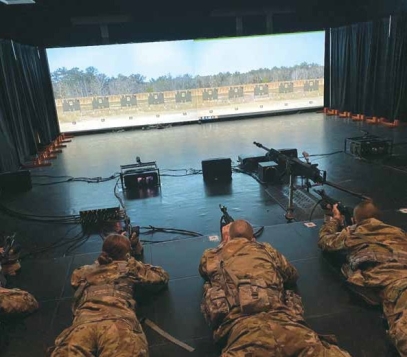
The West Point Simulation Center (Sim Center) was established to address this need. The mission of the Sim Center is to educate, train, and inspire the Corps of Cadets to meet these challenges by designing, developing, and applying full-spectrum, technology-based simulation training capabilities. Officially housed within the Department of Military Instruction (DMI), the Sim Center’s primary focus is military training via simulated combat and field scenarios. Yet, the Sim Center also supports instructors and research across numerous academic and athletic departments, including the Department of Behavioral Sciences and Leadership, the Department of Foreign Languages, and the Department of Geography and Environmental Engineering.
The Sim Center delivers modeling and simulations to support the training, education, and development of cadets. Central to military instruction, every cadet receives training through the Sim Center and can participate in training simulations throughout the year.
“There’s a big difference between learning about tactics and performing them while on patrol or seeing a terrain map of Afghanistan and negotiating its mountains.”
— Victor Castro, Deputy Director of the West Point Simulation Center
“We are the middle step between the classroom and the field,” says Victor Castro, Deputy Director of the West Point Simulation Center. “There’s a big difference between learning about tactics and performing them while on patrol or seeing a terrain map of Afghanistan and negotiating its mountains.” The Sim Center trains cadets on nearly every pre-commissioning training task via simulation and does so efficiently. According to Castro, the Sim Center can train up to 1,200 cadets in just nine days.
Currently, the Sim Center encompasses a 2,100-square-foot computer lab in Washington Hall hosting 89 computer terminals that run a variety of training simulation programs, along with housing various training equipment. Among these programs are Virtual Battlespace 3 (VBS3), the Army’s top training simulation program; the Engagement Skills Trainer 2000 (EST) II, a virtual weapon firing simulator supporting three modes of weapons training; the Computer Assisted Virtual Environment (CAVE), where users stand in a simulated virtual environment; and the Combat Mission Professional, which enables a cadet in the role of squad or platoon leader to run battle scenarios, tactical maneuvers, and decision- making strategies in an artificial intelligent (AI) environment.
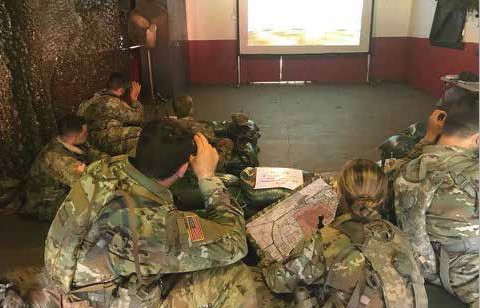
Beyond military training, the Sim Center’s capabilities have applications across academic departments. For example, the Department of Foreign Languages uses simulations in teaching and applying language. Using VBS3, cadets learn to maneuver as squads and platoons speaking in a different language, and with the EST, cadets are required to give directions and guidance to a squad in the language they are learning.
The Department of Behavioral Sciences and Leadership applies simulations for learning in two courses. PL150: Psychology and Leadership 150 utilizes VBS3 as a
practical exercise in metacognition, allowing cadets to participate in a custom scenario that incites discussion on several decisions made by their peers within the first-person environment. PL475: Human-Computer Interaction, a capstone course, uses the Sim Center as a lecture and technology-based learning environment. This course offers cadets a firsthand knowledge of the Army Program of Record, and provides them with the experience of participating in the entire scenario analysis, design, and development process and complete testing and evaluation of the scenarios as they work to solve key Army problems of the human-to-machine interface and improve it.
Expanding the Sim Center will allow for multiple capabilities that instructors and cadets can use to achieve different educational and training objectives. In addition to current programs, expanded capabilities will include virtual reality (VR) immersive training, augmented reality (AR) training, Army legacy systems (such as Engagement Skills Trainer), Synthetic Training Environment Network (STE), and Modeling and Simulation Research. The enlarged space, to be located in Bradley Barracks, can be equipped and configured to support these systems, capabilities, and new technology that may be developed over time.
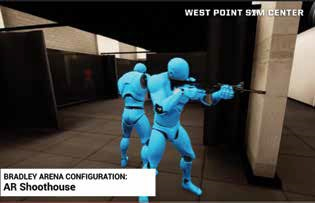
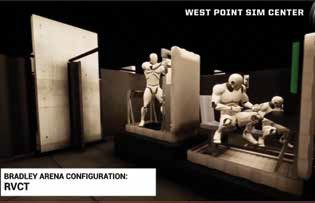
The further development of the Sim Center will expand the center’s reach and sustain its work into the future. Staying current with new technologies and ensuring periodic technology refreshes to maintain state-of-the-art hardware, software, and cyber-security tools will ensure the Academy keeps pace with evolving training and operational needs and provide ongoing opportunities for cadet and faculty research to complement academic and military training.
The Sim Center plays a vital role in understanding how technology enables learning and leveraging it to prepare our graduates to lead and thrive in tomorrow’s complex and technologically advanced environments.

